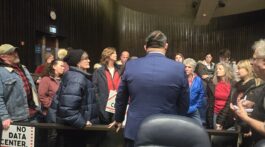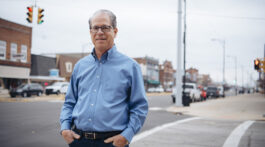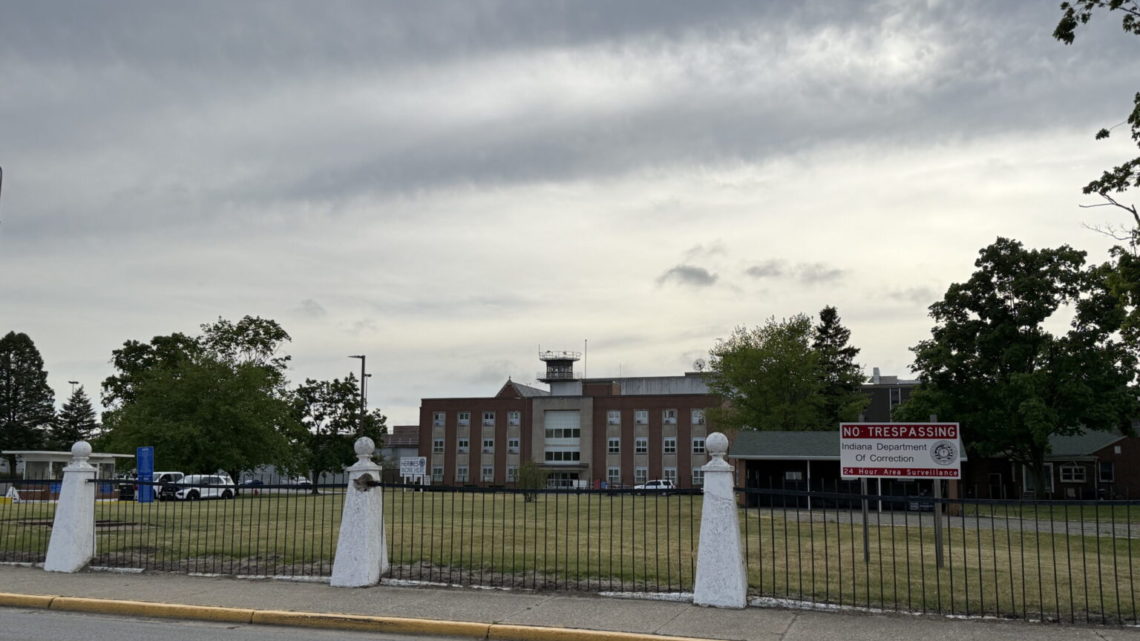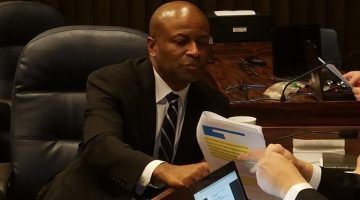by Casey Smith, Indiana Capital Chronicle
May 20, 2025
Death row inmate Benjamin Ritchie was executed by lethal injection shortly after midnight Tuesday at the Indiana State Prison in Michigan City, according to Department of Correction officials.
The death sentence was carried out nearly 25 years after Ritchie shot and killed Beech Grove law enforcement officer William Toney. The condemned man had been on death row since his conviction in 2002.
Details about the 45-year-old’s execution were sparse. No media were permitted to witness the process.
Defense attorney Steve Schutte, who viewed the execution, told the Indiana Capital Chronicle immediately after that he saw Ritchie lift “violently” from the gurney shortly after the process began.
“He violently sat up — raised his shoulders — and twitched violently for about three seconds,” Schutte said. “He didn’t collapse back down. It looked like, from my perspective, that he just kind of relaxed back down and had no movement for another couple of minutes, and then they closed the curtains.”
A statement posted on the DOC website at 1:04 a.m. Central Time indicated that “the execution process” started shortly after 12:00 a.m., and that Ritchie was pronounced dead at 12:46 a.m. It’s not clear when exactly the execution drug, pentobarbital, was administered.
Ritchie’s last meal was the Tour of Italy from Olive Garden. His last words were: “I love my family, my friends, and all the support I’ve gotten. I hope they all find peace.”
DOC officials did not hold a press briefing or provide additional information.
In a late Monday order, the U.S. Supreme Court denied Ritchie’s request for an emergency stay.
Republican Gov. Mike Braun, following a unanimous recommendation from Indiana’s Parole Board, rejected the inmate’s clemency plea last week.
“Since Benjamin Ritchie’s conviction in 2002, his case has been heard and reviewed numerous times by both state and federal courts, including the Indiana Supreme Court and the U.S. Supreme Court, never resulting in an overturned sentence,” Braun said in an early Tuesday statement. “Ritchie’s final appeal for clemency was met with an unanimous recommendation from the State Parole Board that his execution proceeded as scheduled. Today, Ritchie’s sentence has been carried out as ordered by the court.”
No independent witnesses
The Capital Chronicle made numerous requests to be placed on Ritchie’s personal witness list but was denied.
A federal judge on Friday rejected a request by the Capital Chronicle and four other news outlets to pause a state law and DOC policy barring independent media witnesses.
News reporters are granted access to a designated area outside of the Indiana State Prison but are not permitted to directly witness the state’s actions — unless invited by the condemned to fill one of the five spots.
The Capital Chronicle confirmed Ritchie had four witnesses present at the execution, which included two of his attorneys, Schutte and Mark Koselke, as well as a litigation specialist. The fourth individual, a woman, was not identified. The fifth witness spot was left unfilled.
Ritchie was also allowed to have a pastor present in the execution chamber.
Schutte said he and Ritchie’s three other witnesses could see most of the inmate’s body from their viewing room, which has a window to the execution chamber.
The lawyer said witnesses entered the room around 12:35 a.m., and window blinds were raised “shortly after.”
After the blinds were lifted, Ritchie, secured to the gurney, “raised his head, looked at us and smiled — he signaled to us with his hand,” Schutte recalled. “He was speaking. We couldn’t hear him — there was no amplification — but he was pretty clearly speaking, and his left hand was flexing, and his feet were moving around.”
A few minutes after the blinds opened, Schutte described Ritchie’s sudden, “violent” body movement. He could not hear Ritchie when it happened, nor could he see if Ritchie’s eyes were opened or closed. Schutte also was unable to see the reactions, if any, of anyone present in the execution chamber with Ritchie.
“I have no idea what any of that means,” Schutte said. “There may be nothing. … I couldn’t sense that he was in any pain. I think it may have just been a muscle reaction. … But I don’t know.”
Schutte said the blinds were closed around 12:51 a.m. Witnesses left the room around 12:53 a.m. Schutte said Ritchie’s remains will be released to his family. The lawyer was unsure whether an autopsy will be performed.
It’s also not clear who — or how many — witnessed the execution on Toney’s behalf. State law permits up to eight witnesses for the victim.
Defense attorneys were able to spend “several hours” with Ritchie earlier in the day Monday.
Schutte said Ritchie “had visits all weekend” and much of the day Monday. After his attorneys left the prison around 6 p.m., Ritchie was additionally allowed to make several final phone calls, although Schutte did not indicate who was contacted.
Outside the state prison Monday night, two dozen peaceful protesters — including multiple clergy members — gathered to pray and called on state officials to stop the execution.
In the hours preceding Ritchie’s execution, Rev. Richard Holy, of the Catholic Diocese of Gary, led the small group through scripture readings and songs.
Intercessions called for Ritchie and other death row inmates to know “(God’s) unending love and forgiveness.” Holy prayed, too, for Ritchie’s defense team; DOC personnel tasked with conducting executions; and “for all those impacted by acts of grave harm, especially the family, friends and colleagues” of Toney.
“May they and all victims of crime know your healing power and be transformed by your mercy,” Holy said.
Death Penalty Action, a nonprofit that advocates against executions, loaned to protestors the “Delaware Bell,” which the group has rung outside more than a dozen other executions.
The bell continued to echo outside the prison shortly after midnight, as Ritchie’s execution began.
Ritchie previously exhausted all of his post-conviction appeals but sat on death row for more than two decades.
Capital punishments were put on hold for 15 years in Indiana until state officials announced last year that they’d acquired pentobarbital to resume executions.
Ritchie was Indiana’s second execution in six months.
Convicted killer Joseph Corcoran was put to death in December. Capital Chronicle reporting revealed the state paid $900,000 for execution drugs, but officials won’t say how much was purchased. Senior Reporter Casey Smith attended that execution as part of Corcoran’s five witnesses.
Final pleas rejected
The underlying crime began as a police pursuit of a stolen van on Sept. 29, 2000. Toney, the Beech Grove police officer, later pursued Ritchie on foot. Ritchie ultimately fired four shots at Toney, who was hit just above his bullet-proof vest. The officer did not survive the shooting.
Toney died just hours before his 32nd birthday. He was survived by his wife, Dee Dee, and two young daughters.
“Officer William Toney lost his life 25 years ago serving the community he lived in. Taking a solemn oath to uphold the constitution and the laws of this great state, that its citizens may lead a peaceful life,” the Beech Grove Police Department said in a Monday afternoon statement, ahead of Ritchie’s execution.
“His life was violently taken from him by an individual whose actions adversely affected the innocent and ripped at the very fabric that holds society together,” the statement continued. “While there is no peace in the execution, there is comfort in the realization that society has kept its promise to the men and women of law enforcement to hold those accountable for their reckless choices and damaging actions, so that those still serving find strength knowing that their service is not in vain.”
Republican Indiana Attorney General Todd Rokita requested an execution date for Ritchie last fall. It wasn’t until April 15 that the state supreme court scheduled the lethal injection to take place before sunrise Tuesday.
“Early this morning, justice was served with the execution of Benjamin Ritchie, who was convicted of the heinous murder of Beech Grove Police Officer William Toney on September 29, 2000,” Rokita said in a statement.
“Today’s action ensures that justice was done to honor Officer Toney’s sacrifice for his community. With the Indiana Supreme Court’s decision to set his execution date and the state’s resolve to carry it out, we have reaffirmed our commitment to upholding the rule of law and protecting our communities. Let this serve as a message to those who would harm our men and women in law enforcement.”
Ritchie’s attorneys argued that brain damage from Fetal Alcohol Spectrum Disorder (FASD), which was only recently diagnosed, had never been fully considered in court.
“Benjamin Ritchie spent his final days reconnecting with those who love him and discovering the positive impact he had on many people’s lives. Tonight was the result of prioritizing finality over fairness,” Koselke said in a statement. “We continue to believe, as did half of the Indiana Supreme Court, that Ben’s execution was inappropriate. Indiana executed a man with profound brain damage and developmental disabilities.”
Indiana set to execute man who killed officer; family ‘needs closure,’ but lawyers say it’s unjust
Defense counsel wanted to explore the FASD diagnosis before the Indiana Supreme Court, but the justices denied requests for a new hearing.
The inmate’s lawyers separately sought a last-minute execution pause from the U.S. Supreme Court and the federal court for Indiana’s northern district.
Those requests were also denied.
Ritchie expressed remorse for the killing during a clemency hearing held earlier this month at the state prison.
“I was just a kid … I didn’t care about myself, I didn’t care about anybody — nothing,” he told the parole board. “I’ve ruined my life and other people’s lives, and I’m so sorry for that night.”
Six other men remain on Indiana’s death row. Three death penalty cases are additionally pending in central Indiana, including two involving police officer deaths.











